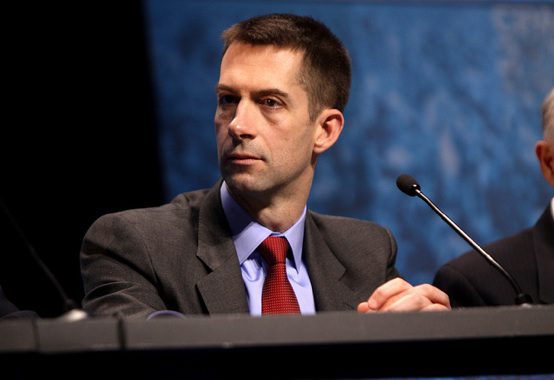Cotton’s Dishonest Attack on Diplomacy with Iran

Tom Cotton makes an odd claim to start his latest op-ed:
A nuclear-capable Iran is the gravest threat facing America today.
If that were true, the U.S. would be even more secure than anyone thought, since a “nuclear-capable Iran” is not much of a threat to the U.S. or to anyone else outside of its immediate vicinity. It may be less than optimal for Iran to have a nuclear capability, but it is far from being “the gravest threat” that America faces. This is the foundation of the rest of Cotton’s argument, and it is very wrong. Everything that follows from it is therefore badly misguided. Cotton is petrified of a thoroughly manageable and relatively minor threat. His assessment of the threat is mistaken, and his recommendations are necessarily unwise.
Cotton continues:
Our negotiating “partner,” Iran, is not a rational or peaceful actor.
Iran may not be peaceful, but it is a regime that desires its own preservation and acts accordingly. It is as rational an actor as any other authoritarian state with which the U.S. has had dealings over the decades. To assert that it is not a rational actor requires us to ignore over three decades of self-interested behavior by this regime.
Cotton portrays the negotiations with Iran as an “endless series of concessions,” which is either misinformed or dishonest. Since Cotton is not a stupid or poorly-informed person, I have to assume it is the latter. The U.S. has conceded almost nothing in these talks. Acknowledging that Iran can continue limited enrichment gives away very little, since Iran has been able to operate without any limitations for a decade before the interim agreement was negotiated. In return for agreeing to minimal Iranian enrichment, Iran’s nuclear program has been significantly constrained and Iran is now farther away from the ability to build a nuclear weapon than it was a year and a half ago. The U.S. has gained far more from the interim agreement so far than Iran has, and Iran has given up far more than the U.S. and the other members of the P5+1 have. Cotton’s presentation of this advantageous arrangement as “appeasement” is so thoroughly misleading that it is discredits everything else he has to say. His insistence on “complete nuclear disarmament” of Iran (i.e., the abolition of Iran’s nuclear program) is totally unrealistic, and if it became U.S. policy it would commit our government to wage a new and costly war.
Unlike some of his Senate colleagues, Cotton has been blunt in stating his view that Congress should be seeking to end the negotiations with Iran. This is irresponsible and dangerous for all parties. To end negotiations with Iran at this stage would not only throw away the best chance to limit Iran’s nuclear program through peaceful means, but it would put the U.S., Iran, and the entire region on a path towards unnecessary conflict. Cotton is a hawkish ideologue, and it seems clear enough that he welcomes the prospect of a new conflict, but that is all the more reason why it is imperative that his reckless counsel be ignored.